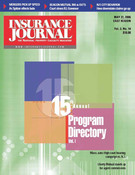Like so many other areas of life, the Internet changed the exposures involved in affinity group programs. In fact, e-commerce and e-mail have taken some of the affinity out of affinity groups.
When I first started underwriting and marketing property/casualty programs for associations and franchise groups (just 12 years ago!), the Internet was not really a factor for small businesses. Today, exposures for franchises that appear to be the same can vary widely because they take different approaches to using computers and are connected to the Internet.
Insurance agents must pay close attention to the Internet activities of their clients and remain vigilant if their clients are in franchise programs. The franchise client’s approach to e-commerce and e-mail may create unique exposures. The exposures could be in any combination of property, general liability, advertising/personal injury, contractual liability, professional liability, employment practices, or even directors and officers liability. There may even be a need for special Internet coverage that goes beyond the coverages offered as part of the program.
Taking on responsibilities
Consider two similar brick and mortar franchise retailers that sell the same merchandise. One might add a Web site that is just a high-tech advertisement of the business location and products with little additional exposure. If the other franchisee starts to take orders through the Web site, that retailer takes on responsibilities to safeguard customer information. Use credit cards, and the responsibility gets ratcheted up. Allow clients to conduct business, like stock trades, through the Web site and security becomes critical. Exposure questions can even be created if the retailer is selling merchandise that is legal in one country but illegal in another country, adding international exposures.
For a professional office, such as a doctor, professional liability exposures can change radically if medical information is displayed on the doctor’s Web site. The information is available worldwide. At what point might the doctor be in danger of violating standards or laws in another state or even country? Consultations for out-of-state doctors over the Internet may complicate professional liability exposures. And don’t forget the doctor’s responsibility to safeguard patient medical information.
A business can find itself in legal hot water just by being a victim, if it does not use appropriate security precautions for its Internet connection. The business’ server might be compromised by a phishing or hacker gang and used to send thousands of phishing or virus-laden e-mails that are traced to the business but not traced all the way back to the ultimate criminals.
Even as a victim, the business could lose reputation and goodwill if it is linked in the press to an Internet criminal scheme. The reputation of a professional firm could also be jeopardized if its Web site is hacked and links are changed to take unsuspecting visitors to offensive Web sites.
From a property standpoint, a business’ computers can mean the difference between conducting business and closing, even without Internet complications. Whether the program includes computer-specific coverage or not, an agent will want to evaluate the insured’s specific needs and keep up with changes as the insured develops and grows his/her business. For instance, what coverage will respond if a virus or other attack scrambles the insured’s hard drive(s)? Normal business interruption coverage might not apply, especially if there is no physical damage.
E-mail: road to trouble
Even if a business does not have a Web site, nearly all use e-mail. E-mail is quick and efficient. It can also be a fast road to trouble. I call the following my “E-mail Is” Checklist:
E-mail is: quick and easy to use, but…
E-mail is: too easy to send to too many people on the spur of the moment with a message that will be misunderstood;
E-mail is: anything but anonymous — it is traceable back to the sending computer;
E-mail is: forever — it resides on all servers it visits during its journey to the sender;
E-mail is: discoverable in litigation;
E-mail is: not secure, although good encryption can provide reasonable security until it reaches its destination;
E-mail is: anything but private; and
E-mail is: an employment practices issue, pitting employees’ expectations of privacy from managers against the employer’s responsibilities to the outside world.
A final thought about e-commerce and e-mail: the one constant in the Internet universe is change. Your insured’s exposures can change significantly in just a few months as the business’ Internet use and sophistication expands. Ongoing communication with the client is important.
An agent once told me that there are no problems, only opportunities. All of these exposures present local agents with opportunities to add value, while enhancing their own reputations and client relationships. This is a customizing opportunity for both coverage and loss prevention. It could even mean additional, account rounding sales for the agent. E-commerce and e-mail activities provide agents with the ability to enhance their own positions with their insurance clients while taking advantage of affinity group programs.
David Golden is director, commercial lines, for the Property Casualty Insurers Association of America. Prior to joining PCI, his insurance career spanned nearly 20 years in commercial lines underwriting and marketing positions, including affinity group programs and working in agency settings.
Was this article valuable?
Here are more articles you may enjoy.


 Zurich Insurance Profit Beats Estimates as CEO Eyes Beazley
Zurich Insurance Profit Beats Estimates as CEO Eyes Beazley  State Farm Adjuster’s Opinion Does Not Override Policy Exclusion in MS Sewage Backup
State Farm Adjuster’s Opinion Does Not Override Policy Exclusion in MS Sewage Backup  Judge Tosses Buffalo Wild Wings Lawsuit That Has ‘No Meat on Its Bones’
Judge Tosses Buffalo Wild Wings Lawsuit That Has ‘No Meat on Its Bones’  Florida Regulators Crack the Whip on Auto Warranty Firm, Fake Certificates of Insurance
Florida Regulators Crack the Whip on Auto Warranty Firm, Fake Certificates of Insurance 


